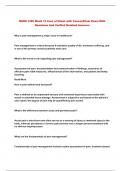NURS 1495 Week 13 Care of Client with Cancer&Pain Exam With
Questions And Verified Detailed Answers
Why is pain management a major issue in healthcare?
Pain management is critical because it maintains quality of life, minimizes suffering, and
is one of the primary reasons patients seek care.
What is the nurse's role regarding pain management?
Assessment of pain, documentation and communication of findings, assurance of
effective pain relief measures, effectiveness of the intervention, and patient and family
teaching.
Read More
How is pain defined and assessed?
Pain is defined as an unpleasant sensory and emotional experience associated with
actual or potential tissue damage. Assessment is subjective and based on the patient's
own report; the degree of pain may be quantified by pain scales.
What is the difference between acute and persistent pain?
Acute pain is short-term and often serves as a warning of injury or imminent injury to the
body, whereas persistent or chronic pain persists over a longer period sometimes with
no obvious ongoing cause.
What are the fundamentals of pain management?
Fundamentals of pain management include routine assessment of pain, treatment based
,on patient's specific goals, use of multiple drug and nondrug treatments, and
multidimensional approach.
How are drugs used in pain management?
Pharmacotherapy Pain relief includes the use of equianalgesic dosing for pain, using
scheduled dosing to prevent pain rather than waiting for severe pain to occur, and the
use of combinations of rapid-acting agents for breakthrough pain and long-acting
agents for continual pain management.
What are some nonpharmacological therapies used for pain?
Massage, therapeutic exercises, TENS, heat and cold applications, and various
cognitive techniques such as distraction and relaxation are employed.
What are some barriers to pain management?
Tolerance, physical dependence, addiction, and misconceptions about measures that
can help to control pain are common barriers.
How are ethical issues resolved in pain management?
Ethical concerns including analgesics hastening death and the use of placebos in
management, must be carefully decided with informed judgment.
Why are age-related factors an important consideration in pain management?
Age is a factor in the experience, reporting, and management of pain; and different
considerations must be given to the various age groups, such as children and the
elderly, for safe and effective pain relief.
What are the considerations when one analgesic is replaced by another?
, Considerations include equianalgesic dosing in order to maintain equivalent pain relief
effects, and adjusting for route of administration.
How is the dose of analgesics optimized for pain management?
Optimal dosing covers prevention or control rather than resorting to severe pain; hence,
the use of a combination of fast-acting for breakthrough pain and long-acting drugs for
continuous pain control.
What are the non-pharmacological methods of pain relief that could be effective?
These may include massage, TENS, heat and cold applications, and other cognitive
techniques such as distraction and relaxation to minimize the need for analgesics and,
in this case, reduce its adverse effects.
How does nursing management contribute to pain relief?
Nursing management includes believing the client's report of pain, communicating
concern, ensuring commitment to pain management, and effective communication with
the health care team.
What are some challenges to effective pain management?
Challenges include the problems of tolerance requiring higher doses for the same pain
relief, physical dependence, addiction, and misconceptions about these terms.
What are some of the ethical issues that may arise in managing pain?
Ethical issues include the potential for hastening a patient's death with analgesics, and
the use of placebos, that are controversial to some, in the assessment and treatment of




